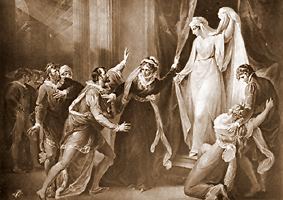
Outline of my report
Painted
by William Hamilton, R. A. Engraved by Robert Thew.
 |
Outline of my report Painted
by William Hamilton, R. A. Engraved by Robert Thew. |
Thesis statement
In Winter's Tale, the speech of Hermione and Paulina always stirs Leontes's anxiety. Outdone by his wife's power of language, Leontes wrongly accuses his wife of adultery, and then uses his male power granted by the society to tyrannize his wife, who dares to disobey the law of gender hierarchy.
I. Introduction
In many of texts of Renaissance drama, women are not urged to merely to chastity, obedience, and silence; they are admonished to repress even gestures and facial expression, any visual sign of opposition to their husband. In the early seventeenth-century treatise Counsel to the Husband: to the Wife Instruction (1608), women are exhorted even in the face of male tyranny, drunkenness, and abuse, not to fret, scold, or scowl, for 'if such saw their faces then in a glasse, it would make them love the practice of such behavior the worse for ever' (Newman, 9).
II. Female rhetoricians
A. Hermione succeeds in persuading Polixenes to stay longer, while her husband fails.
Her. You shall not go; a lady's "verily" is
As potent as a lord's íK(I.ii.50-55).B. Paulina shows too much rashness of a woman by scolding Leontes severely.
Paul. But, O thou tyrant!
Do not repent theses things, for they are heavier
Than all thy woes can stir; therefore betakes thee
To nothing but despair. A thousand knees,
Ten thousand years together, naked, fasting,
Upon a barren mountain, and still winter
In storm perpetual, could not move the gods
To look that way thou wert (III. ii. 207-15).
C. Paulina sucessfully persuades Leontes not to remarry unless she leaves.
Paul. "Care not for issue,
The crown will find an heir. Great Alexander
Left his to th' worthiest; so his successor
Was like to be the best (V.i. 46-58).
Paul. Will you swear
Never to marry but by my free leave?
Leon. Never, Paulina, so be bless'd my spirit! (V.i. 69-71)
III. Male tyranny
A. Leontes separates his son from his wife.
Leon. I know's too well.
Give me the boy. I am glad you did not nurse him.
Though he does bear some signs of me, yet you have too much blood in him (II. I. 55-7).
B. Leontes charges Antigonus of his inability to rule his wife, and then excludes Paulina from his male-dominated sphere.
Leon. How? Away with that audacious lady! Antigonus,
I charge'd thee that she should not come about me:íK
What? Canst not rule her? (II. Ii. 41-6)
C. Not only deaf to his couriers' advice, Leontes also challenges the oracular voice that justifies his wife's innocence.
Leon. I have said she's an adult'ress (II.i. 87)
Leon. There is no truth at all I' th' oracle.
The sessions shall proceed; there is mere falsehood (III. ii. 140-41)D. D. Polixenes tyrannizes his son, Perdita, and the old shepherd, while his authority as a father is challenged.
Pol. Mark your divorce, young sir
Whom son I dare not call. Thou art too base
To be [acknowledg'd]. Thou, a sceptre's heir,
That thus affects a sheep-hook! Thou, old traitor,
I am sorry that by hanging thee I can
But soften thy life one week. And thou, fresh piece
Of excellent witchcraft, whom of force must know
The royal fool thou cop'st with---(IV.iv.417-23).
Conclusion
Restored to life, Hermione justifies her guiltlessness. Her resurrection represents the triumph of good over evil and life over death, but her concluding silence has shown that deplorably women have to be silent and obedient in the male-dominated world.